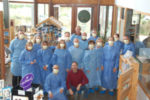EUROWA project comes to a close (for now)

After two years of working together, Sea Alarm and its project partners concluded the EU-funded EUROWA project at the end of 2016. The project has broken much new ground in European oiled wildlife response.
A Module (as defined in EC terminology) has been described and developed, consisting of qualified oiled wildlife response experts and their equipment, that can be mobilised to assist in European oil spills at the request of a European authority.
The project partners have defined a Standard Operating Procedure (SOP), detailing how they would operate in case of an international mobilisation, and established a well-maintained stockpile of wildlife response equipment (kept in Hamburg) for mobilisation.
The EUROWA team has also created a range of training course packages for different functions in a wildlife response team, including modular packages for Advanced oiled wildlife responders, Response Specialists, Section heads, Specialist Veterinarians and Wildlife Response Managers. Creation of these courses, which were run for the first time in 2016, marks an important milestone in standardising response procedures in the region. Persons trained according to EUROWA courses can act as first responders in their own country and can also readily integrate into a mobilised international team.
The outputs of this project allow European countries to start working to the same standards and principles, making for a more cohesive and successful future response. Sea Alarm acted as coordinator of the two-year project, which was funded by the European Commission’s Civil Protection Financial Instrument.
Sea Alarm will continue working with the EUROWA project partners in the future to share the results of the project, to increase the number of trained responders in Europe, and to assist European authorities in integrating the Module into their national response systems.
Further news and developments regarding EUROWA will continue to be published on the www.eurowa.eu.

